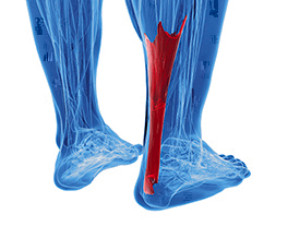
Injuries to the Achilles tendon are some of the most common problems among runners. The Achilles tendon, medically known as the calcaneal tendon, is located at the back of the heel. It is the strongest tendon in the body, connecting the heel bone to the muscles in the calf. When the Achilles tendon is torn or ruptured, it can be extremely painful and inhibit daily activities. In some cases, the Achilles tendon becomes inflamed, thought to be caused by overuse. This will result in tenderness to the touch, as well as pain when first waking up. Also, the calf, ankle and heel will feel stiff. Many times, after engaging in a run, the tendon pain subsides for a while, but increases again later. Stretching the tendon further may actually increase the problem, experts contend, by hardening and shortening the calf muscles. Instead, taking a break from running and beginning a course of strengthening exercises is recommended. It is a good idea for anyone with Achilles tendon problems to consult a podiatrist for an examination, a diagnosis, and suggested treatment options.
Achilles tendon injuries need immediate attention to avoid future complications. If you have any concerns, contact one of our podiatrists of Summit Podiatry. Our doctors can provide the care you need to keep you pain-free and on your feet.
What Is the Achilles Tendon?
The Achilles tendon is a tendon that connects the lower leg muscles and calf to the heel of the foot. It is the strongest tendon in the human body and is essential for making movement possible. Because this tendon is such an integral part of the body, any injuries to it can create immense difficulties and should immediately be presented to a doctor.
What Are the Symptoms of an Achilles Tendon Injury?
There are various types of injuries that can affect the Achilles tendon. The two most common injuries are Achilles tendinitis and ruptures of the tendon.
Achilles Tendinitis Symptoms
- Inflammation
- Dull to severe pain
- Increased blood flow to the tendon
- Thickening of the tendon
Rupture Symptoms
- Extreme pain and swelling in the foot
- Total immobility
Treatment and Prevention
Achilles tendon injuries are diagnosed by a thorough physical evaluation, which can include an MRI. Treatment involves rest, physical therapy, and in some cases, surgery. However, various preventative measures can be taken to avoid these injuries, such as:
- Thorough stretching of the tendon before and after exercise
- Strengthening exercises like calf raises, squats, leg curls, leg extensions, leg raises, lunges, and leg presses
If you have any questions please feel free to contact one of our offices located in Wilmington, Whiteville, and Wallace, NC . We offer the newest diagnostic tools and technology to treat your foot and ankle needs.
